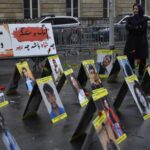
It is the strongman leader’s nightmare conundrum: how to change course on a core policy without imperiling the aura of omniscience and political invulnerability on which his power ultimately rests.
And that’s now a problem for three of the world’s most firmly embedded autocrats – Chinese leader Xi Jinping, Russian President Vladimir Putin, and Iranian Ayatollah Ali Khamenei
They may well find a way out of their current policy predicaments and defuse the popular discontent making itself felt even in their tightly policed countries.
But the challenge they are facing could be altering the terms of what U.S. President Joe Biden has called the central narrative of 21st -century world politics: the struggle between autocracy and democracy.
As recently as 10 months ago, at a summit held days before Mr. Putin rolled his tanks into Ukraine, he and Mr. Xi were confidently promoting the advantages of their brand of nationalist autocracy over what they saw as the West’s flaccid, flailing democracies.
Now those words ring more hollow, and not only because of the unexpected strength and cohesion democracies have shown in pushing back against Mr. Putin’s invasion.
There has also been a change on the other side of the scales.
The predicament facing the leaders of China, Russia, and Iran is providing something of a reality check on their claims to have found a better, more responsive, and effective style of government. It is also highlighting ways in which democratic government – despite its own problems and frustrations – possesses inbuilt strengths that autocracy lacks.
It begins with how decisions get made – a process that inexorably narrows, as an autocrat amasses more and more power, to include few voices beyond the autocrat-in-chief. Autocracies lack the institutional checks that shape policy decisions in democracies, such as public opinion, independent news media, open debate, and robust opposition parties.
Nowhere has the contrast been more starkly evident than in China, where frustration with the official “zero-COVID” policy, imposed through three years of lockdowns, erupted last month into the first major public protests since the bloody 1989 crackdown in Tiananmen Square. They broke out on the heels of a Communist Party Congress formally endorsing Mr. Xi as the country’s most powerful leader since Mao Zedong.
From the outset of the pandemic, it is Mr. Xi who has framed China’s response, with lockdowns of hundreds of millions of citizens and a pervasively enforced system of frequent testing and quarantines. He has trumpeted it as evidence of the superiority of his “China model” over Western countries where the number of cases has been far higher. But on Wednesday, the government effectively abandoned the “zero-COVID” policy, relaxing many of the unpopular restrictions.
In Moscow, the decision to attack Ukraine was taken by President Putin and a small group of pliant advisers. Now, an invasion envisaged as a short, sharp victory has seen Russian forces blocked, battered, and pushed back by the Ukrainians.
Iran’s supreme leader, Ayatollah Khamenei, backed a campaign to tighten enforcement of the law obliging all women to wear the traditional headscarf. The death of a young woman arrested by the country’s morality police for wearing her headscarf improperly has sparked the most widespread protests against the regime since it came to power in 1979.
Faced with the prospect of having to rethink, recast, or retreat from core policy decisions, the leaders of all three countries are facing a distinctly autocratic quandary: how to avoid projecting any sign of weakness or vulnerability.
The safest option is to make no change at all. That’s the route Mr. Putin and Ayatollah Khamenei seem determined to take for the time being.
This makes Mr. Xi’s decision in recent days to change course on his pandemic policy all the more extraordinary. Though the government had signaled that it would ease the restrictions over time, the president confidently reaffirmed the wisdom of his “zero-COVID” policy at the recent party congress, and was clearly not contemplating any early, major change.
The fact that many restrictions are now being lifted seems to reflect the depth of Mr. Xi’s concern about the public protests.
It has been an autocratic change of course. The official government line is that the “zero-COVID” campaign has been a success. And while restrictions have been loosened, police presence at protest sites has been strengthened, references to the demonstrations have been scrubbed from China’s already censored cyberspace, and some protesters have been detained.
Democratic leaders, of course, also make decisions that go wrong, and they face protests.
The results can be messy, sometimes forcing a change of policy, a change of leader, or a period of gridlock as arguments inside and outside government determine what comes next.
Yet the stakes are dramatically different in China, Russia, and Iran. There, any major shift risks calling into question the power, judgment, and political interests of a single person.
Perhaps one old democrat, Britain’s Winston Churchill, put the distinction best. “Democracy is the worst form of government,” he said, “except for all those other forms that have been tried.”
Related stories
Read this story at csmonitor.com
Become a part of the Monitor community




